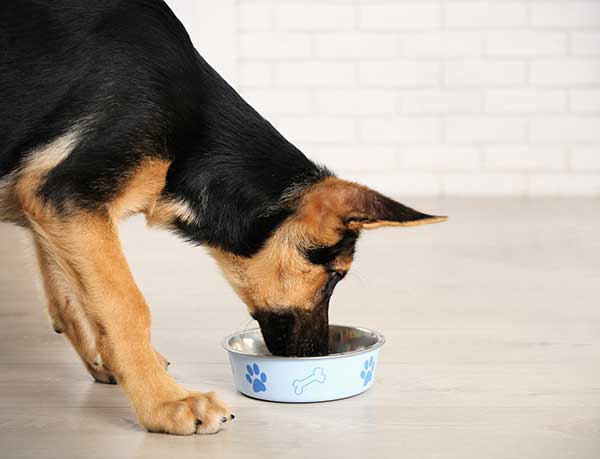Dogs are known for their incredible ability to develop an instant liking for human foods, especially meat-based foods like salami.
Well, that’s perfectly understandable. While dogs are technically omnivores, their dietary habits tend to gravitate more towards animal protein than plant-based foods. So, the sight of salami will surely pique your dog’s interest.
And since salamis are also famous for their irresistible aroma and mouthwatering taste, most dogs will likely develop a taste for this food right from the first encounter with it.
But as you shall find, not every food that’s considered healthy and nutritious for humans can be consumed by dogs. Which begs the question, can dogs eat salami?
Yes, dogs can eat salami. However, they probably shouldn’t. While your pooch will unlikely drop dead from snacking on salami, there are serious health risks involved if the animal helps himself to more salami than he should. Note that although salami is meat-based, the food also tends to contain high levels of salt, spices, and other ingredients that could be injurious to your dog’s health.
So, can dogs have salami or not?
You can feed salami to your dog, provided that you do so in moderation. You should never allow the food to replace your dog’s staple diet. If possible, try to establish the safety of all the ingredients used before feeding salami to your canine friend.
This post shall share more insights on salami and dogs, but first things first.
Just What Is Salami?
It’s not unusual to come across a pet parent wondering, is it ok for dogs to eat salami?
As we’ve just pointed out, salami is okay for dogs if fed in moderation. However, there could be risks if a dog consumes more salami than he should, especially if the food is prepared with potentially toxic ingredients.

But before we delve deeper into the potential benefits and health risks of salami for dogs, you could be wondering just what salami is.
Now, salami is a special type of cured sausage that’s made from fermented and air-dried meat. Salamis are thought to have originated in Italy, although their actual origin remains unknown. However, the food has been around for thousands of years, and was mostly popular among Southern, Eastern, and Central European peasants.
The primary reason behind salami’s popularity among early European peasants was its relatively long shelf life. After cutting and curing, salami could last several months at room temperature without going bad. It, therefore, supplemented seasonal shortages of fresh meat.
Traditionally, salamis were made from beef or pork meat. The beef option appears to be more popular among cultures and religions that generally discourage pork consumption.
In addition to beef and pork, salami could also be made from the meat of any domestic or even wild animal, including poultry, horse, donkey, venison, etc.
Besides meat, salami contains various other ingredients, including;
- Minced fat
- Salt
- Sugar and/or other sweeteners
- Spices like garlic, onions, and pepper
- Preservatives like phosphates and propyl gallate
- Extenders and binders, including dry milk, cereals, and flours
- Vinegar
- Wine
- Other herbal extracts
In terms of nutritional value, the average salami contains about 20% protein, 35% fats and 25% sodium, with spices, and other ingredients making up the remaining 20%.
- HUMAN-GRADE: If you wouldn’t eat it, why would you feed it? From the ingredients they’re made with to the kitchens they’re made in, our treats…
- ALL NATURAL: Our kitchen-crafted Chicken Jerky Hip and Joint contains all natural whole muscle chicken breast, U.S. sourced chondroitin and…
- HIGH QUALITY INGREDIENTS: Truth is our first ingredient. We carefully cook our natural Chicken Jerky Hip and Joint in small batches using honest…
Last update on 2024-12-17 / Affiliate links / Images from Amazon Product Advertising API
Health Benefits of Salami for Dogs
As we’ve already highlighted, salami contains up to 20% protein, the very nutrient that dogs rely heavily on.
Protein plays several vital roles in your dog’s body. Most notably, it supplies the animal with amino acids which form the building blocks of muscles, tissues, skin, hair, nails, tendons, and ligaments. Protein also plays a primary role in hormone production.
Another essential mineral that your dog can obtain from salami is taurine. Taurine is necessary in promoting your dog’s healthy eyesight as well as boosting his cardiac functions. In fact, taurine deficiency has been linked to blindness and canine dilated cardiomyopathy (DCM).
DCM is a disease that mostly attacks your dog’s cardiac muscles. Dogs with dilated cardiomyopathy usually exhibit symptoms of lethargy and incoordination occasioned by low heart rate and enlarged cardiac muscles. If untreated, the disease could lead to heart failure and the eventual death of your canine friend.
In addition to boosting the performance of your dog’s eyes and heart, taurine might also enhance fat digestion as well as reproductive health.
The fact that salami can last several months without going rancid is another benefit, particularly for pet parents. Due to that extended shelf life, dog owners can store a stockpile of salami, ensuring that there’s always enough salami available to share with their canine friend.

So, is salami safe for dogs?
Well, based on the above health benefits, it’s logical to conclude that salami is safe and beneficial for dogs. But before you decide to feed salami to your pooch, it’s also important to familiarize yourself with some of its inherent health risks.
The following section shall expound further on some of the common dangers of feeding salamis to dogs.
Potential Risks of Salami to Dogs
As you shall find, the potential risks of salami to dogs depends on two factors; the amount of salami your dog has eaten and the specific ingredients used in preparing the food.
The following are some of the top salami ingredients, and how each ingredient might impact your dog’s health;
1. Processed meat
Meat constitutes more than 80% of a dog’s diet. Even though dogs have tried to adopt some of our dietary habits since we domesticated them, they still prefer meat to plant-based foods. Plus, we’ve just mentioned that the meat used in salami contains essential minerals that your dog might benefit from.

So, there shouldn’t be any problem offering meat to your pooch, right?
Well, that’s technically right, but not always the case with the meat used in preparing salamis.
The fact that salami is prepared from processed meat makes the food outright unhealthy for your canine friend.
Processed meats contain lots of seasonings and preservatives, including phosphates, propyl gallate, BHA (butylated hydroxyanisole), and BHT (butylated hydroxytoluene). These preservatives are usually added to extend the food’s lifespan.
Continued exposure to processed meat could increase your dog’s risks of developing colorectal cancer and cardiovascular disease.
Also, the fact that salami is air-dried and fermented (as opposed to cooked) means there are always risks of bacterial contamination, particularly from the salmonella bacteria. Eating salami that contains salmonella could lead to salmonella poisoning, a disease that’s medically referred to as salmonellosis.
Salmonellosis mostly manifests in gastrointestinal distress, and some of the symptoms to watch out for include vomiting, diarrhea, loss of appetite, and abdominal discomfort. In addition to gastrointestinal distress, salmonellosis could also cause palpitations and fever in a dog.
- GRAIN FREE DOG FOOD: This premium high protein dog food is specifically formulated as a gluten free, grain free dry dog food suitable for active dogs…
- 33% PROTEIN DRY FOOD: Packed with premium-quality beef, pork and fish meals
- ALL BREEDS, ALL LIFE STAGES: Suitable for all life stages of small dogs, medium dogs and large breed dogs, this premium dog food is an ideal food for…
Last update on 2025-01-17 / Affiliate links / Images from Amazon Product Advertising API
2. Salt
Salt is arguably the second-most toxic salami ingredient after processed meat.
Now, salt is usually added to salami as a preservative, which implies that long-term exposure could lead to cancer and cardiovascular disease.
Besides acting as a preservative, salt is also added as a condiment.
Either way, dogs (and pets in general) shouldn’t consume too much salt. Dogs, in particular, have a very low tolerance for high-sodium foods.
For reference, a medium-sized dog shouldn’t consume over 100 milligrams of salt per day. Sadly, a thin slice of salami contains as many as 149 grams of salt, which is already way higher than a dog’s recommended daily intake (RDI. Exceeding a dog’s RDI of salt could trigger a condition known as salt ion/sodium ion poisoning.
Sodium-ion poisoning manifests in a wide spectrum of symptoms, including;
- Gastrointestinal issues like nausea and vomiting, diarrhea (which could lead to dehydration), loss of appetite, and abdominal pain
- Kidney problems, as is usually evidenced by frequent urination and excessive thirst sensation
- Fatigue
- Fever
- Headaches
- Tongue swelling
- Irritability
- Confusion and poor coordination
- Body tremors and seizures
If untreated, sodium ion poisoning could escalate into a coma and even kill your dog.

3. Spices
Many spices are just as toxic to dogs as salt is. Onion and garlic have been cited as some of the most toxic human foods that dogs should never eat. Unfortunately, they also happen to be some of the most common spices used in salamis.
Like all members of the Allium family, onions and garlic contain significant levels of thiosulphates and disulfides. If ingested, each of these compounds could trigger a severe form of anemia known as Heinz body anemia.
Some of the symptoms of Heinz body anemia include;
- Gastrointestinal issues like vomiting and diarrhea
- Enlarged liver and/or spleen
- Jaundice, or the yellowing of the skin
- Lethargy and lightheadedness
- Cardiac palpitations
- Certain congenital defects
- 10 Benefits in 1 Daily Treat – PetHonesty’s 10-For-1 Multivitamin chews combine a well-rounded blend of the most essential vitamins and supplements…
- Joint Health with Glucosamine – These natural supplement soft chews have high amounts of glucosamine and other joint support ingredients that reduce…
- Improve Digestion with 1 Billion CFU Probiotics – These one a day dog vitamins contain probiotics and pumpkin, which help keep your dog’s digestive…
Last update on 2024-12-21 / Affiliate links / Images from Amazon Product Advertising API
4. Fat
The United States Department of Agriculture (USDA) limits the fat content in foods like bologna, hot dogs, and salamis to 30%.
Unfortunately, we have plenty of salamis with fat content as high as 60%.
Now, the risks of fats for dogs are well documented.
Lifestyle diseases like obesity and diabetes are the common health risks associated with fats. Fatty foods are also known to produce laxative effects in dogs, and could trigger vomiting and diarrhea. Worse yet, fatty foods like salami could cause pancreatitis, or the inflammation of the pancreas.
An inflamed pancreas can cause vomiting, diarrhea, and excruciating abdominal pain for your dog.
The following are other salami ingredients, along with their potential health risks to your pooch;
5. Sugar
Often used as a sweetener, sugar could cause oral and dental problems like tooth decay.
High sugar levels could also increase the dog’s risks of developing diabetes.
6. Extenders and binders
Common extenders and binders used in salamis include dry milk, cereals, and flours.
Milk is discouraged for dogs as it contains lactose, the very sugar that dogs are intolerant to. Flours and cereals may not be immediately toxic to dogs, but they come with close to ZERO nutritional value.

7. Vinegar
Vinegar might cause an upset stomach, especially if consumed in large amounts.
Well, then, is salami bad for dogs?
Based on the potential risks we’ve just highlighted, it seems that feeding salami to your dog may not be an excellent idea.
What Salamis Should Dogs Eat?
Now, experts recommend not feeding salami to dogs in the first place. But if you must, do so in moderation and after having established the safety of the ingredients used.
It’s also important to understand the type of meat used, as well as establish whether your dog can consume salami or not.
The following questions might further help you to decide whether to feed salami to your dog or not;
Can dogs eat beef salami?
Not only is beef the most common meat used in salamis. Meat-based salamis also happen to be the safest, provided the other ingredients are equally safe.

Can dogs eat Genoa salami?
Genoa salami is basically salami that’s thought to have originated in Genoa, Italy, which usually has a characteristic fermented flavor.
Genoa salami is usually made of pork and veal, and then seasoned with salt, garlic, white or red wine, and black or white peppercorns.
While pork and veal may not present any health risks to your dogs, the seasonings might. So, you should generally avoid feeding Genoa salami to your pooch.
Can dogs eat peppered salami?
While pepper is not immediately harmful to dogs, too much of it could trigger an upset stomach as well as vomiting and diarrhea. So, dogs should only eat mildly-peppered salamis.
Can dogs eat spicy salami?
Since most spices are potentially hazardous for dogs, you should avoid giving spicy salami to your canine friend.
Can dogs eat cooked salami?
Yes. In fact, you’re better off feeding your dog cooked as opposed to uncooked salami. That’s because cooking destroys some of the bacteria that the meat could be harboring, such as salmonella.
- Real meat is the number 1 ingredient in our bacon flavored treats. Big. bacony flavor in small dog treats made with small dogs in mind and made to…
- Beggin’ Strips for dogs made with real bacon. Only 7 calories per Purina Beggin’ Fun Size strip
- Tempting texture of dog strips is easy to chew. Beggin’ Fun Size strips provide the ultimate treat experience
Last update on 2025-01-02 / Affiliate links / Images from Amazon Product Advertising API
Can dogs eat cotto salami?
‘Cotto’ is basically the Italian word for ‘cooked.’ So, if dogs can eat cooked salami, then cotto salami is also fine for them.
Can dogs eat uncured salami?
Curing salami serves to extend the food’s shelf life. But the preservatives used may be toxic to dogs, which makes uncured salami the safer alternative. However, ensure that the uncured meat is fresh before offering it to your dog.
Can dogs eat dry salami?
You’re better off feeding wet salami to your dog than dry ones, for the simple reason that dry dog foods tend to trigger dehydration.
Can small dogs eat salami?
Not recommended. Remember that small dogs have a more sensitive digestive system. Therefore, salami might trigger more severe side effects in them.
What of elderly dogs, can elderly dogs have salami?
Elderly dogs shouldn’t eat salami because of their rather suppressed immunity. As such, their bodies might not effectively ward off some of the diseases caused by salami, such as salmonellosis. The same applies to expecting dogs, sick dogs, and dogs that are recovering from a surgical operation.

How Much Salami Can A Dog Eat?
There’s no hard and fast rule on how much salami to feed your dog. As you shall find, that depends on various factors, such as the animal’s age, size, and general health condition.
As we’ve just mentioned, very young, very old, expecting, and sickly dogs shouldn’t have salami. Neither should dogs that are recovering from a surgical procedure.
For healthy dogs, experiment with two or three salami slices and observe how the animal responds before upping the portions. If you notice any adverse reactions, withdraw the food immediately and ensure the dog doesn’t have access to salamis ever.
Now, there are various methods on how to prevent your dog from eating salami. The most effective trick is to ensure the animal never gets to see salamis in the first place.
That means clearing the tables immediately after consuming salami and storing leftovers in places the dog cannot access, such as high shelves. Better yet, you can supplement with numerous salami alternatives out there, including animal foods like chicken, beef, and lamb, or plant-based foods like beets, celery, pumpkin, and apple slices.
But since you can never be too careful, it’s also important to know what to do if your pooch has consumed salamis. Indeed, you could be wondering, ‘what to do if my dog ate salami?’ Well, the best course of action if you suspect that your dog has consumed salamis is to visit your vet immediately.

Conclusion: So, is salami ok for dogs?
Salami is not immediately toxic to dogs. However, the risks of feeding salamis to dogs far outweigh the benefits. So, you should consider other foods like beef and chicken instead. And should you insist on feeding salami to your canine friend, only do so occasionally and in moderation.
Checkout Our Favorite Dog Products
1. BEST PUPPY TOY
We Like: Snuggle Behavior Toy with Heart Beat & Heat Pack – Ideal toy for new puppies.
2. BEST DOG TRAINING PROGRAM
We Like: Doggy Dan The Online Dog Trainer – Stop any dog problem and raise the perfect puppy with The Online Dog Trainer.
3. Best Bone Broth for Dogs
We Like: (Solid Gold – Human Grade Bone Broth for Dogs) – Simmered Beef Bone Broth With Turmeric Provides A Nutrient-Dense And Flavorful Addition To Your Dog’s Meal + Rich In Natural Collagen From Beef Bones.
4. BEST DOG DNA TEST
We Like: Embark Dog DNA Test – Embark screens for over 250 dog breeds + tests for 170+ genetic diseases including MDR1 drug sensitivity, glaucoma, degenerative myelopathy, and dilated cardiomyopathy, some of the most common adult-onset diseases in dogs.
5. BEST DOG PUZZLE TOY
We Like: Outward Hound Interactive Puzzle Toy – Every dog loves chasing squirrels at the park. The Outward Hound Hide-a-Squirrel Puzzle Toy gives your dog the same feeling as though he was outdoors chasing live squirrels.






